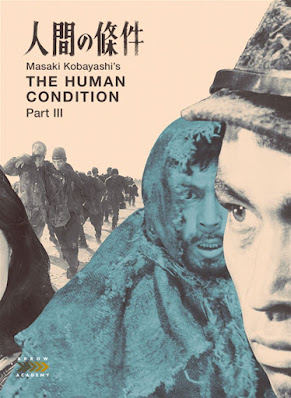The Human Condition III: A Soldier's Prayer (1961)
Director: Masaki Kobayashi
Stars: Tatsuya Nakadai, Michiyo Aratama, Tamao Nakamura
Runtime: 190 minutes
Synopsis: His ideals challenged by life as a conscript in war-time Japan's military, a pacifist faces ever greater tests in his fight for survival.
Verdict: Kaji's arc comes to a close in a harrowing way in the final two parts of what I firmly consider now to be one of the greatest trilogies of all time. His contributions at a labor camp and later on the battlefield have made him a shadow of what he once was. Only his love for Michiko and his socialist beliefs remain from the pacifist we've grown to admire in the first chapter of his story. He has become a product of the atrocities of war, a changed man who has to live with the burden of having killed soldiers who were thrown in situations similar to his.
His psychologic journey resembles that of Dante in the Divine Comedy, where Virgil, representing conflict in his case, guides him from heaven (No Greater Love, where he was still at peace with himself), to purgatory (Road to Eternity, where he struggles to stay faithful to his pacifist doctrine), to finally hell (A Soldier's Prayer, where he reaches a place of no return). His sense of humanity has not completely faded away as he still very much takes it upon himself to prioritize the needs of others before his, but you can tell that he's terrified of the man he has become, a man he would've despised a few years prior.
"A Soldier's Prayer" is a fitting conclusion to his development, which will reside rent-free in my head for a while despite slightly paling in comparison to its prequels. It's about 20 minutes shorter than the first part but felt longer due to a relative lack of growth achieved by the protagonist. Similar to "Saving Private Ryan" for instance, it was more about a group of characters' desperate journey of getting from point A to point B.
But it's clear that the entire trilogy must be viewed as a single narrative, making "A Soldier's Prayer" a slightly longer-than-needed but nevertheless fascinating final act of a story that is both interesting in its macro and micro aspects. It's a captivating look at the psychology of war, but it also serves as a painting of Japan during World War II. They're a lot more than just movies, they're pieces of history.
FINAL GRADE: 8/10

Comments
Post a Comment